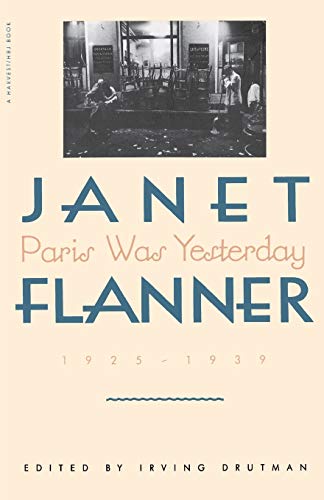Paris Was Yesterday, 1925-1939
Janet (Genêt) Flanner
BOOK REVIEW

There's an enchantment surrounding the streets of Paris that seems to hang in the air, clinging to its art, coffee, and tumultuous history. This is the backdrop for Paris Was Yesterday, 1925-1939, a mesmerizing collection of observations by the notable American journalist Janet Flanner. With every turned page, you are whisked into a world on the brink of transformation-a Paris that reflects the very essence of life and art through its golden age, ultimately leading into the shadows of an impending war.
Flanner's keen eyes act as a lens capturing the spirits of a city that was both a sanctuary for intellectuals and a stage for the surreal. As she navigates the opulent salons of the elite, echoing past laughter heavy with the smoke of cigarettes and whispered ideas, her prose becomes emblematic of a vibrant society grappling with political unrest and cultural renaissance. Here, she nestled among greats like Hemingway and Fitzgerald, challenging the notion of the expatriate as a mere observer. Instead, this was the era's passionate participant, and Flanner's role as a chronicler of that time speaks volumes about her innate ability to weave narrative and history into an intoxicating tapestry.
Reading Paris Was Yesterday is like sipping an espresso in a cozy café on the Left Bank-there's a thrill in notes of nostalgia that ripples through her reflections. She writes not just of events but wraps you in the emotional fabric of Paris itself. Take, for instance, how her sharp commentary on the avant-garde art movements prompts you to ponder the delicate balance between madness and genius. Flanner's words reach out, tugging at you, nudging your curiosity to uncover the lives of iconic figures, like Gertrude Stein and Cocteau, who paraded the city's streets, leaving indelible marks on the creative world.
But don't let the charming Parisian narrative lull you into complacency; amid the lyrical reflections lies an underlying tension-a tension that mirrors the increasing political turmoil of late 1930s Europe. As Flanner details the rise of fascism and the growing specter of World War II, one cannot help but feel the urgency in her writing. It's a warning, a clarion call urging contemporary readers to confront the past and reflect on our own turbulent times. In many ways, Paris Was Yesterday becomes a prophetic tale, echoing the pivotal questions of identity and morality that we grapple with today.
Readers have reacted to Flanner's work with a blend of awe and adoration, often proclaiming her ability to transport them into the emotional heart of Paris. However, some voices have raised an eyebrow at her penchant for romanticizing the past. Critics declare her style slightly elitist, hinting that her chronicles may gloss over the less glamorous realities of the masses. Still, like the most potent artworks, her prose invites debate, stimulating your mind and igniting your imagination.
Each vignette Flanner presents serves as a historical artifact, made fresh and raw through her distinctive lens. It's not just a collection of essays; it's a love letter to a city that birthed dreams and inevitably witnessed despair-yet flourished in its contradictions. You find yourself lost in the alleys of Montparnasse, feeling the pulsating energy of life through her words, as you encounter the struggles of a society caught between ambition and anxiety.
As you unravel this narrative, something deep within you awakens. The visceral pulse of Flanner's observations offers a chance to experience the essence of Paris-a place where creativity and crisis converge, leading you to profound introspections on your own existence. Far from being a passive spectator, you are compelled to ponder the artistic movement that envelops us, urging you to reflect on your position within it.
Ultimately, Paris Was Yesterday, 1925-1939 is not merely a collection of essays; it is a timeless exploration that intertwines history, culture, and human emotion into a singular experience. Flanner's work breeds a fierce longing for understanding and connection, both to the past and to one another, making it an essential read that lingers long after the last page is turned. If you crave an adventure filled with passion, reflection, and the alluring ambiance of a bygone Paris, then your journey awaits-dive into the pages and let them set your soul ablaze. 🌟 ✈️
📖 Paris Was Yesterday, 1925-1939
✍ by Janet (Genêt) Flanner
🧾 264 pages
1988
#paris #yesterday #1925 #1939 #janet #genet #flanner #JanetGenetFlanner